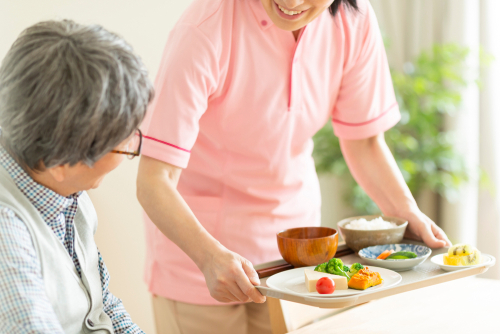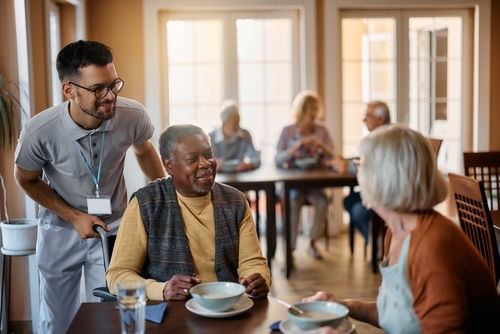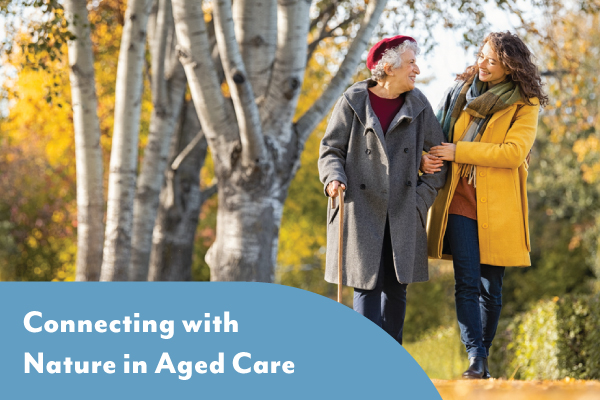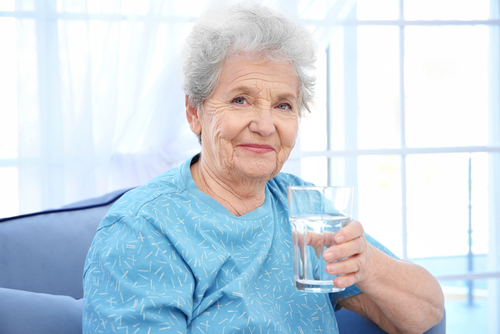Nutritious food is an essential factor in supporting healthy ageing. Whether in residential care or in the home, elderly people need good sources of protein, calcium, vitamins, minerals and fibre to sustain a healthy mind and body.
But it doesn’t end there – studies also show that things like personal preference and communal eating are just as important when it comes to the wellbeing of people in aged care. Let’s dive into the topic of nutrition in aged care.

Why is elderly nutrition so important?
It might sound like a trick question, but let’s go into why appropriate nutrition is essential for elderly adults. As we age, staying hydrated and eating a supportive diet helps maintain cognitive function and healthy bodily systems. This means reducing the risk of mental decline as well as things like unhealthy weight loss, broken bones, organ failure and physical weakness. It also means improving immune function, making elderly people more resilient when it comes to recovering from injury and illness.
The consequence of malnutrition
For elderly people the consequences of poor nutrition can be severe, irreversible and even fatal. Poor nutrition increases the risk, severity and ability to heal from illness and injury. A poor diet can lead to frailty, pressure injuries, loss of bone and muscle mass, cognitive impairment, loss of bodily functions, mental health issues and in worst cases even death.
It’s not just physical, either. When elderly people are not encouraged or able to eat what they like, share meals and enjoy culturally appropriate foods the mental and emotional impacts can be devastating.
Raising the bar on nutrition in aged care
Prioritising healthy, happy nutrition in aged care is a crucial part of meeting the findings of the Royal Commission to give elderly people the ability to age with dignity, satisfaction and joy. At Selmar, we believe that understanding the importance of nutrition is a step toward meaningful change.
Unfortunately, ongoing reports suggest that malnutrition is rife in residential care especially, with alarming numbers of older people either malnourished or at risk. This can be due to a range of physical changes like loss of appetite, poor dentition, trouble swallowing and multiple medications, as well as cultural factors like poor food quality, inadequate care and loss of cultural knowledge in some residential settings.
Support healthy eating for older adults
Basically, healthy nutrition comes down to three key factors: good food, adequate hydration and promoting wellbeing. Although elderly people are less active their basic requirements for food and water don’t really change. In fact, our daily requirements remain the same for much of our adult lives.
With loss of appetite and other factors present it can be difficult to encourage healthy eating and drinking habits, but that doesn’t mean we can’t try! Ways to encourage nutrition include:
- prioritising communal mealtimes for mental health relief
- finding out what people like to eat and providing options
- helping them access foods that are culturally appropriate
- promoting diversity at mealtimes by including a range of fruits, vegetables and proteins in the meals on offer
Food choice is a human right and it’s important that elderly people in both residential care and the home are presented with a range of options from which they can select a desirable meal.
How to avoid dehydration
Chronic dehydration is a serious problem for people in aged care. It’s recommended that elderly people still drink 1.5L of water per day, which can seem impossible when there are factors present like effects from medication, trouble swallowing and difficulty drinking. Some elderly people may experience fear surrounding hydration because they’re worried about choking, dribbling, feeling sick or having to go to the toilet.
Ways to mitigate these issues include:
- support at mealtimes – this may include helping them sit up, hold cups or drink from straws
- when water isn’t tolerable, encouraging consumption of clear liquids like herbal tea and supplementary drinks
- caring and respectful consultation with the person about their reasons for refusing hydration
- listening and being patient

Food is more than fuel
Food is not just essential for the body – it can help fulfill cultural identity, connect people with family and friends, bring back memories and promote pleasure and joy.
Aged carers can honour the amazing capacity of food to act in this way. Let’s never underestimate nutrition’s capacity to change someone’s life.
Make mealtimes matter
We know how much mealtimes matter, which is why our aged care courses cover nutrition in aged care, wellbeing, and meal assistance for elderly people in care. If you think nutrition is non-negotiable, start your journey with Selmar today.




